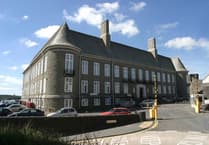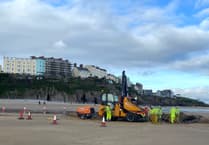Safer and more convenient walking and cycling routes have been created throughout the village of Lamphey, thanks to a major project carried out by Pembrokeshire County Council.
The scheme has involved the whole community, including the residents, Lamphey Primary School, Lamphey Community Council, and St Faith and St Tyfei Church.
It was funded by the Welsh Government’s Safe Routes in Communities programme, receiving £758,918 in grant funding over three years.
The first phase of the project was the completion of 15 separate measures to improve road and pedestrian safety in several different locations, sincluding wider pavements, new footways, traffic calming, and cycle shelters.
The second phase was a complex scheme to dismantle and rebuild a 40m section of the churchyard wall and rebuild it 2 metres back from the roadway. This allowed a new footway to be constructed alongside the wall, enabling children in the village to walk safely past the church to the local primary school.
Cllr. Phil Baker, Cabinet Member for Infrastructure, Licensing and Major Events, said that combined, the measures had given Lamphey a joined-up network of safe routes to the church, school, railway station, village hall and Freshwater East.
“Lack of footways and safe routes through the village have been an issue in Lamphey for many years and this fantastic scheme and substantial investment has improved road and pedestrian safety enormously,” he said.
“Residents and visitors now have a continuous, safe pavement right through the heart of the village and children can walk to school in safety.”
Headteacher of Lamphey School, Simon Thomas, praised the improvements and said the new footway past the church had in particular made an enormous difference.
“As well as making it much safer for pupils to use active travel to get and from school, it means that when as a whole school we visit the church or village hall, we can do so safely and easily,” he said.
“Beforehand, it was a major operation with staff acting as traffic monitors to ensure the children’s safety.”
Tilly, in Year 6, said that when she used to walk past the church, the vehicles were often so close that she could feel the wind from them passing by.
“Everyone had to walk flat against the wall and you had to walk quickly and be very careful,” she said. “It’s much better now, you can just stroll along without worrying about the traffic.”
Ruby, also in Year 6, said the new pavement was beneficial not just for current pupils, but future generations.
“The younger age groups and children who go to school in years to come will benefit from this just as much as ourselves,” she said. “It’s also great out of school hours – we can walk and cycle around much more safely than we could before.”
Cabinet Member for Social Services, Cllr Tessa Hodgson, who is also local member for Lamphey, said she hoped the work would help improve the wellbeing and health of local residents.
“I think the lockdowns during Covid made us realise how much we enjoy being outdoors and seeing friendly faces, and so by enabling the community to walk and cycle around more easily, bumping into friends and neighbours on the way, it will help our health and fitness, and create that valuable sense of wellbeing that comes from connecting with others.”
The second phase of work - moving the church wall back 2 metres from the roadway - was a massive undertaking and one that required a great deal of sensitivity and engineering skill.
The idea was initiated by local resident Mrs. Margaret Morgan, church warden at Lamphey for over 30 years, who liaised between local residents, the County Council and the church to bring it to successful fruition.
The project was carried out by contractors Evan Pritchard, working closely with DAT Archaeological Services and highways project manager Phil Leggett. It necessitated respectfully excavating post-medieval graves, which were subsequently reburied within the churchyard at the end of the project.
Mrs. Morgan’s fellow church warden Vicky Tomlinson carried out extensive research to support the work and said it was fascinating from an historical point of view.
“The archaeological excavation recorded many other features in addition to the graves,” she said. “Among them was a possible enclosure ditch that could have enclosed an earlier church if not a preceding prehistoric settlement.
“Evidence of an early 19th century lime kiln was also found together with some unusual pottery. The oldest items unearthed were a pair of large boulders believed to be examples of glacial erratics possibly deposited there thousands of years ago, while some of the most recent items included Goodwick bricks made in the early 20th century.”
Fran Murphy, Head of DAT Arch Services, said a lime kiln was a surprising structure to find inside a churchyard.
“It may have been sited outside the churchyard in the past but as the churchyard grew it was demolished and was enclosed within its boundary wall,” she said.
“Other finds included pottery ranging from the Romano-British period through to the 19th century. In West Wales we find very little pottery on archaeological sites and so when we do, we’re very pleased. It’s extremely useful in helping us to date a site.”
Fran said the evidence highlighted the development of the church and the depth of settlement history.
“In summary, the excavation has illustrated how long people have lived and worshipped in Lamphey; for at least 2,500 years from prehistoric times to the present day.”
Mrs. Morgan, who has lived in Lamphey all her life, said the new footway past the church and the other improvements were of enormous benefit to the local community.
“It’s absolutely brilliant,” she said. “I’m so grateful to everyone who’s worked tirelessly on this project to make it happen. It’s taken a long time, and a lot of hard work, but we’ve got there!”
• A report by DAT Archaeological Services on their work at St Faith and St Tyfei Church in Lamphey will be available by Easter on their website at: https://www.dyfedarchaeology.org.uk/wp/




